education philosophy 教育哲学
Schools of philosophy
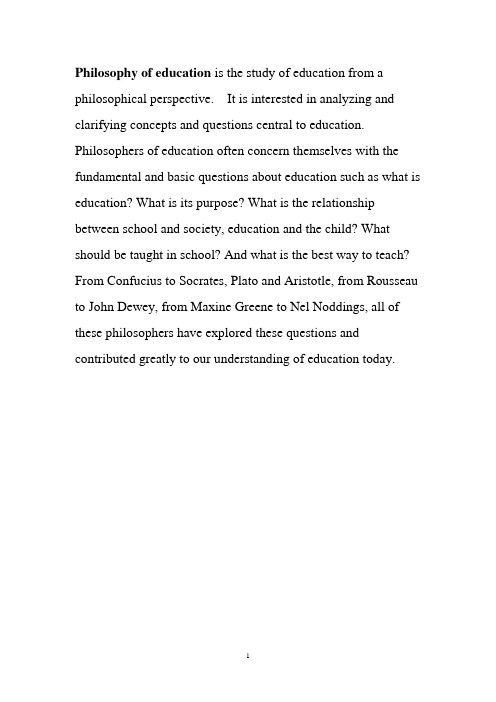
Philosophy of education is the study of education from a philosophical perspective. It is interested in analyzing and clarifying concepts and questions central to education. Philosophers of education often concern themselves with the fundamental and basic questions about education such as what is education? What is its purpose? What is the relationship between school and society, education and the child? What should be taught in school? And what is the best way to teach? From Confucius to Socrates, Plato and Aristotle, from Rousseau to John Dewey, from Maxine Greene to Nel Noddings, all of these philosophers have explored these questions and contributed greatly to our understanding of education today.Schools of Philosophy of Education 教育哲学流派Philosophical debate started with the dualism of idea vs. object, 观念和实物之争,抽象的知识和具体的世界哪个更重要。
教育学名词(二)全国科学技术名词审定委员会

教育学名词(二)全国科学技术名词审定委员会作者:来源:《中国科技术语》2013年第01期教育潜力 educational potentiality 尚未被利用或尚未被充分利用的以人、财、物为表现形式的各种潜在教育资源。
教育改革 educational reform 为解决教育与社会或个人发展不相适应的部分或环节,使教育得以自我完善或持续存在和发展而对教育的体制、内容、方法等进行的改善与更新。
教育传统 educational tradition 历史地形成的、为整个社群或国家所认同、共享并世代相传的教育观念、教育制度、教育内容、教育方法等的总称。
教育变迁 educational change 在某一较长历史时段中教育的发展与变化。
教育民主 educational democracy 政治民主理念在教育中的引申。
强调教育过程应以自由、平等、参与、协商、交流、沟通、共识等为价值基础的观念、诉求、制度安排与具体实践。
教育民主化 democratization of educational system 以民主精神改造教育、重建学校秩序的教育思潮或行动。
教育现代化 modernization of education 社会现代化过程中发生的教育变化。
是在教育思想、教育制度、教育内容、教育方法、教育条件等方面逐步与现代社会相适应的历史进程,也是教育的现代性形成和丰富的过程。
教育世俗化 secularization of education 发生于普及教育初期的欧美国家,为发挥国家影响、推行教育普及而使教育与宗教相分离,教育权从教会向国家转移的历史进程。
教育先行 education as a priority for national development 教育发展领先于经济发展的政策理念和政策安排。
主要体现为:教育发展的速度应超越经济发展的速度;教育应以未来经济发展的需要为依据培养人才。
人的全面发展 allrounded development (1)人的身心的充分、和谐发展。
教育哲学educational philosophy
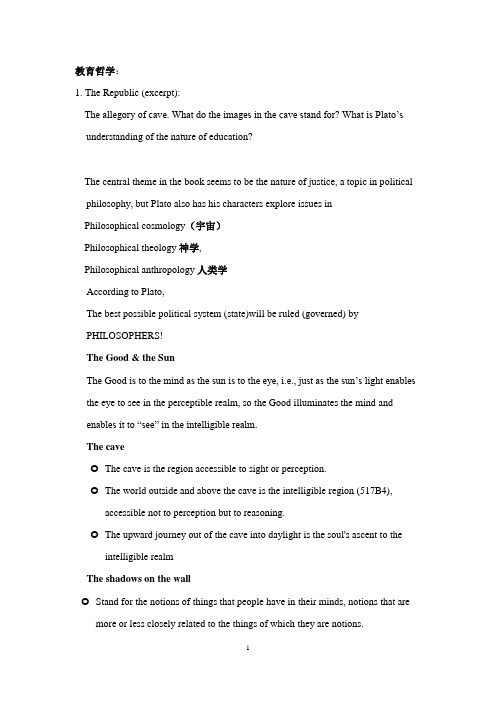
教育哲学:1. The Republic (excerpt):The allegory of cave. What do the images in the cave stand for? What is Plato‟s understanding of the nature of education?The central theme in the book seems to be the nature of justice, a topic in political philosophy, but Plato also has his characters explore issues inPhilosophical cosmology(宇宙)Philosophical theology神学,Philosophical anthropology人类学According to Plato,The best possible political system (state)will be ruled (governed) byPHILOSOPHERS!The Good & the SunThe Good is to the mind as the sun is to the eye, i.e., just as the sun‟s light enables the eye to see in the perceptible realm, so the Good illuminates the mind andenables it to “see” in the intelligible realm.The caveThe cave is the region accessible to sight or perception.The world outside and above the cave is the intelligible region (517B4), accessible not to perception but to reasoning.The upward journey out of the cave into daylight is the soul's ascent to the intelligible realmThe shadows on the wallStand for the notions of things that people have in their minds, notions that are more or less closely related to the things of which they are notions.The puppets and objects from which the shadows are castStand for what we call real things--real rhinos, real countries with their actual living conditions, and anything else that one encounters in the world.The sunStands for the idea of goodness or "the Good."The Allegory of the Cave describes four stages through which a person has to pass to get a sound education. These stages are distinguished by what a learner is able to see. An ignorant person can see only shadows—without even suspecting that they are not real things.A fully educated person can see the shadows, the puppets that cast the shadows,the original things after which the puppets are modeled, and the sun that makes the original things visible.The purpose of Platonic educationTo free the soul of the things that turn its sight downward and to reorient it towards the truth (519A8-B5). Such education is liberating. It is also liberal -- Plato insists that studies in the mathematical sciences not be "compulsory"(epanagkês), on the grounds that "compulsory intellectual work never remains in the soul" (536D5-E4).At the age of 30 there would be another selection; those who qualified would study dialectics and metaphysics, logic and philosophy for the next five years.They would study the idea of good and first principles of being. Afteraccepting junior positions in the army for 15 years, a man would havecompleted his theoretical and practical education by the age of 50.2. The Education of Nature:Education of nature, education of men, education of things; Habit vs. nature; Making a man vs. making a citizen; Public and common education vs. individual and domestic education3. The Democratic Conception in Education:¢1.What is democracy? What are two traits of a democratic society? What is democratic education?It is not just a form of government, but primarily a mode of social life that is unique in providing an adequate setting for human flourishing.“A freeing of individual capacity in a progressive g rowth directed to social aims.”Dewey thus conceives of democracy itself as educative in a way thatreconciles the good of the individual and the good of society.¢2. What are the strengths and critics of the Platonic educational philosophy?¢3.What are the strengths and critics of the “individualistic” ideal of the eighteenth century?¢4. What are the strengths and critics of the institutional idealistic philosophy of the nineteenth century?¢5.What is Dewey‟s philosophy of education?Education is a social process; education is growth; education is not a preparation for life but is life itself.4. Banking v. Problem-solving Models of Educationl What is banking mode of education?The teacher talks about reality as if it were motionless, static, compartmentalized, and predictable. Or else he expounds on a topic completely alien to the existential experience of the students. His task is to 'fill' the students with the contents of his narration.Banking education seeks to maintain the contradiction. It does not engage students in critical thinking, instead, it requires the students to be passive and to adaptthereby serving the purposes of oppression. It inhibits creativity, it resists dialogue, it is fatalistic in nature.l What is problem-solving mode of education?In problem—posing education, people develop their power to perceive critically the way they exist in the world with which and in which they find themselves; they come to see the world not as a static reality, but as a reality in process, intransformation." Teacher-students and student teachers are continually reflecting on themselves and the world, establishing "an authentic form of thought andaction.”It is in this way that education can be constantly remade, instead of being static. It helps people to look ahead, to hope and plan for the future. "Problem-posingeducation does not and cannot serve the interests of the oppressor.l What are students and teachers‟ roles in these two modes of education?l Can you associate Freire‟s theory to today‟s educational practices?5. Milton Friedman: The Role of Government in Education¢1. What is government‟s role in educ ation? What are the justifications?¢ 2. What role does Friedman propose for the government? What are the justifications?Friedman proposed supplementing publicly operated schools with privately run but publicly funded schools through a system of school vouchers.Friedman argues that choice would create a more efficient and diverse system of schools, a market system in which teacher salaries reflect merit, instead of abureaucratic and mediocre system in which teachers have colluded to link salaries to credentials and seniority¢3. Neighborhood effect, school choice, voucher,6.Philip W. Jackson: Real Teaching¢ What are the four approaches of defining teaching? What do you think of them?Generic approach: Teaching is a system of actions intended to induce learning (Smith). Whether Smith‟s definition of teaching as a system of actions intended to induce learning fits the bill. This definition is too broad.Epistemic approach: Teaching is primarily concerned with the transmission of knowledgeConsensual approach: t o teach is to acknowledge the …reason‟ of the pupil, i.e.his demand for and judgment of reasons, even though such demands are notuniformly appropriate at every phase of the teaching interval (Scheffler).So it is only in a democratic society, or one in the process of becoming so, that teaching can be carried on. This view turns out to be more limiting than edifying.Evolutionary approach: T his approach attempts to locate teaching within “anetwork of relations.” Its place within that network is its ultimate source ofmeaning and significance.¢After reading this chapter, how would you perceived the act of defining teaching?How would you understand teaching?Teaching cannot be defined behaviorally, and that the specific skills a teacher might employ are not “the heart of the matter.”7. Terence H. McLaughlin: Beyond the Reflective Teacher¢the nature, scope and aims of reflection¢the two continua concerning the nature of reflection8. Nel Noddings: The One-Caring as Teacher¢the four steps of teaching the ethics of careDialogue: an essential part of caring that we could not model caring withoutengaging in it. Dialogue can help us evaluate our attempts to care.”Modeling: We need to show the students how to care. Be example.“We do not merely tell them to care and give them texts to read on the subject, we demonstrate our caring in our relations with them”Practice: if we want to produce people who will care for one another, then we need to give students practice in caring and then reflect on that practice.Confirmation: Confirmation is important because it encouraging the acts ofcaring. Confirmation is encouraging and the best in others.9. A Discourse on Grading¢the three species of grading and the functions that each of them servesCriticism: Analyzes a product or performance in the light of standards thatstudents must use as points of reference in order to learn, and its contribution to learnin g place it “at the very heart of education”.Evaluation:issues judgments of absolute merit based on independent standards of excellence.Ranking: Yields a linear ordering based on comparative judgments of theperformances of different students.Wolff argues that evaluation and ranking are external to education as such, and have rationales that are professional and economic. Grades convey criticism in only the most summary way, and seem most useful (if also troublesome) asinstruments of evaluation and ranking.。
教育哲学(PhilosophyofEducation)的涵义

教育哲学(Philosophy of Education)的涵义教育哲学是应用哲学思考,对教育的语言和基本概念加以澄清,或对教育的现象、问题或预设作通全而深入的探索、反省、描述及检证;最後形成教育理论,如教育的基本原理、教育的本质、教育的规范和理想等。
教育哲学主要分为四种取向:首先是「教育原理」(principles of education)的取向。
传统认为哲学家的角色是「爱智者」(the lover of wisdom),因此,这种模式的拥护者,经常将所谓的教育哲学呈现为关於教育的智慧,即教育原理。
教育哲学家的任务在於阐明价值是什麽,而不是探讨价值判断的意义与辩解(meaning and justification)的哲学问题。
所以他们主要是藉由思辨来建立规范性的教育原理。
虽然哲学家可以辨别形成某一原理的经验事实与道德判断,但哲学家却不能权威地宣称这类的原理。
因为原理是语言的混合体,包括概括的复杂经验和价值,其中经验部分不是哲学家所能以权威决定的。
更应注意提供证据和论证,以澄清、修正和改进这类的原理。
其次是教育理念史(history of educational ideas)的取向。
这种模式是将教育哲学视为各大教育思想家理论的介绍,也就是传授历史上伟大教育家所讨论与主张的理念,尝试将他们的着作应用到当代的教育问题上,以找出适当的答案。
但是,严格地说,这类作品只是教育的普通理论,其中充斥着道德化(moralizing)、经验的类化以及哲学思辨等素材。
像卢梭的《爱弥儿》(Emile)是教育理念史的经典,却难以说是哲学分析或论证的优秀作品。
而且,由於这些理念系由着作本文中抽绎出来,并直接应用,学习者必须要有思维形式的训练,以对些思想家在伦理学或认识论上的基本假设或理念做必要的讨论或批判。
第三种教育哲学取向是「哲学与教育」。
这种取向一方面试着说明传统里纯哲学的问题如形上学、心灵论、人性论、认识论等学说与教育的关联;另一方面,从不同的哲学立场如实在论者、观念论者、实用主义者及存在主义者来检查其理论在教育上的含义。
我的教育哲学观论文 (1)

我的教育哲学观院系:教育研究院姓名:石绍惠学号:1032011309027我的教育哲学观摘要:生活是教育之根和本。
教育与生活的脱节有其深刻的科学观和科学哲学根源。
从这个根源出发,我们可以探寻到教育回归生活的途径,那就是从知识教育回归文化教育、再从文化教育回归生活教育的途径。
教育不仅要回归并深深地扎根于现实的生活,从而重新找回生活之根和本,而且还要回归并融于生活的理想,从而引领现实的生活。
教育哲学不仅仅只是理论,它还跟实际生活紧密联系着。
那么如何将这些看上去是理论的东西跟我们的教育经历结合起来,讨论我们所经历的教育是好是坏呢?如何用教育哲学知识来思考教育方法的正确与否呢?等等,这些都需要我们去深入探究关键字:教育哲学教育哲学教育生活经历当代教育问题一、什么是教育教育是培养新生一代准备从事社会生活的整个过程,也是人类社会生产经验得以继承发扬的关键环节,主要指学校对适龄儿童、少年、青年进行培养的过程。
广义上讲,凡是增进人们的知识和技能、影响人们的思想品德的活动,都是教育。
狭义的教育,主要指学校教育,其涵义是教育者根据一定社会(或阶级)的要求,有目的、有计划、有组织地对受教育者的身心施加影响,把他们培养成为一定社会(或阶级)所需要的人的活动。
类型有正规教育、成人教育、技术教育、特殊教育、终身教育等。
二、什么是哲学哲学:爱智慧——来源于古希腊文philosophia, 意思是追求philem 和智慧 sophia.在汉语中,“哲”是智慧的意思。
哲学是“智慧之学”,即关于智慧的学问。
关于人类生存发展和安身立命之学的大智慧。
哲学是以分析思考探究和反省有关生活、知识以及价值等根本问题的学科。
哲学与艺术不同,哲学是通过批判性的思考去处理问题的哲学与科学不同,哲学以纯粹思考来解决问题,科学则以观察和实验为主要方法。
三、什么是教育哲学?(philosophy of education)教育哲学可以理解为用哲学的观点、方法研究、分析、解释教育问题的学问。
第一章 哲学与教育哲学
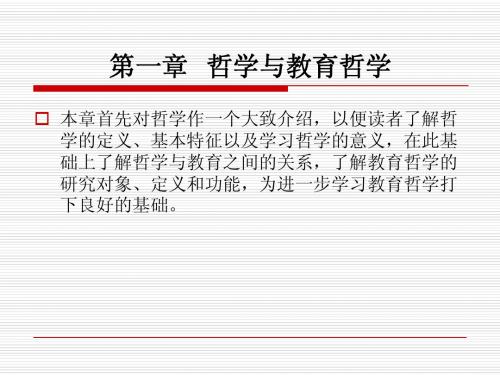
哲学作为一种学科
哲学作为一门知识学科有很长的历史。可以 说哲学是人类最早的知识学科。
哲学作为一种探究方式
哲学的真正意义是作为一种探究的方式,而不只是 作为一种特定的、专门的知识学科。 许多有识之士认为,在对待哲学问题上,除了要 “学”哲学外,还要“做”哲学。所谓“做”哲学, 主要有两层意思:一是坚持自己的抽象理论研究, 但不放弃对现实问题的关注;二是从现实生活世界 的问题中引发对哲学问题的讨论,并提供为一般民 众所忽视的新答案。概括而言,“做”哲学就是强 调把哲学作为一种探究方式。
第一章 哲学与教育哲学
本章首先对哲学作一个大致介绍,以便读者了解哲 学的定义、基本特征以及学习哲学的意义,在此基 础上了解哲学与教育之间的关系,了解教育哲学的 研究对象、定义和功能,为进一步学习教育哲学打 下良好的基础。
第一节 哲学是什么
一、哲学是一种“爱智之学”
“哲学”的原义为“爱好智慧”,它是一种“爱智 之学”。 孙正聿认为,哲学既是爱智的激情,又是“爱 智之忱”的结晶,哲学“熔铸着哲学家对人类 生活的挚爱,对人类命运的关切,对人类境 遇的焦虑,对人类未来的期待”,哲学“不是 超然于人类社会生活之外的玄思和遐想,哲 学不是僵死的教条和冷冰冰的逻辑”。
4.有助于教师形成自己的教育哲学,有 助于学校形成自己的学校教育哲学
教育哲学最终要发挥自己的作用,必须要转化为教师自己个 人的教育哲学和学校的教育哲学,不然的话,可能就仅仅停 留在理论层次上,而不会对具体的教育改革实践产生推动和 促进作用。 教师个人教育哲学主要是个人关于教育工作的基本信念和理想。 这里所指的个人教育哲学,不是指普通人对教育问题的意见, 而是指作为专业工作者的教师对教育工作进行整体反思和领会 之后形成的带有个性色彩的教育信念和教育理想。 学校教育哲学指的是一所学校信奉的教育理念,学校的使命、 愿景和育人目标是其主要内容,其中育人目标是核心,即培养 什么样的学生是学校教育哲学的核心问题,以此为核心,对学 校的使命、愿景进行系统、综合的思考,构成了学校教育哲学 的主要内容。
布鲁贝克的高等教育哲学布鲁贝克《高等教育哲学》读后感
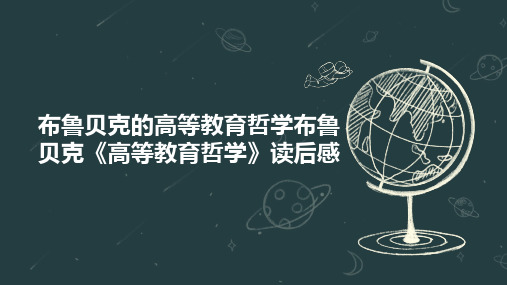
01 引言
03 参考内容
目录
02 高等教育哲学的探讨
引言
约翰·S·布鲁贝克(John S. Brubacher)的《高等教育哲学》 (Philosophy of Higher Education)是一部深入探讨高等教育领域的经典 著作。该书自以来,一直为高等教育研究者、实践者和者所传颂。在本次演示 中,我们将着重探讨布鲁贝克的高等教育哲学思想,以及阅读该书所带给我们 的启示和感悟。
五、建议与展望
在当今社会,随着科技的发展和社会变革的加速,我们需要更加重视知识的价 值并不断提高高等教育的质量。为此,建议教育机构应更加注重课程设置的合 理性和科学性,以帮助学生掌握全面的知识和技能;同时培养学生的道德责任 感和批判性思维能力,以培养具有全面发展的高素质人才。在未来的发展中, 高等教育需要不断创新和完善自身的发展模式,以适应社会的变革和发展需求。
二、知识的价值
1、知识的定义与分类
知识是人类对世界及自身的认识和理解。根据不同的标准,知识可以被划分为 不同的类型,如理论知识、实践知识、显性知识和隐性知识等。理论知识是指 那些关于普遍原理和抽象概念的知识,实践知识则是指那些关于如何做某事的 知识。显性知识是指那些可以明确表达和传递的知识,而隐性知识则是指那些 难以言传和转化的知识。
参考内容三
一、引言
本次演示旨在探讨知识的价值与高等教育哲学的关系,并介绍美国学者约 翰·S·布鲁贝克(John S. Brubacher)的高等教育哲学观点。布鲁贝克在 《高等教育哲学》(The Philosophy of Higher Education)一书中,提出 了独特的高等教育哲学理论,对知识的价值与高等教育的作用进行了深入剖析。
23《教育哲学导论》-王海涛

教育哲学导论教学大纲一、课程介绍1.课程描述本课程为面向全校学生的通识教育选修课,意在通过教育哲学问题的思考和讨论,扩展和深化重要教育问题及哲学问题的理解。
2.设计思路通过哲学问题的思考和讨论,加深对教育哲学问题的认识。
指导学生阅读重要教育哲学文献,分享同学们的简介。
3.无先修课程要求。
二、课程目标1.引导和帮助同学们思考和讨论一些重要的教育哲学问题,如人生与教育、知识与课程、理性与教学、自由与教育、民主与教育等。
通过讨论,帮助同学们了解教育哲学思考的特征,学习对一些教育问题进行教育哲学的思考。
2.指导同学们阅读一些重要的教育哲学文献,学习批判性理解和讨论哲学家及教育哲学家们的主要观点。
3.分享同学们的见解,帮助同学们获得基于理性思考的积极的、自主的、研究性的学习经验。
4.结合课程的学习与问题的讨论,对同学们的内在成熟有所助益。
三、学习要求要求同学们积极参与讨论,与同学分享自己的学习成果,根据指导修读教育哲学文献,完成作业及论文。
二、教学内容四、参考教材与主要参考书1.教材:《新编教育哲学导论》,石中英著,北京师范大学出版社,2007。
2.主要参考书: (1)黄济著:《教育哲学通论》,山西教育出版社,1999。
(2)陆有铨著:《现代西方教育哲学流派》,河南教育出版社,1995。
(3)崔相录著:《20世纪西方教育哲学》,黑龙江教育出版社,1990。
(4)石中英著:《知识转型与教育改革》,教育科学出版社,2001。
(5)金生鈜著:《理解与教育》,教育科学出版社,1996。
(6)周浩波著:《教育哲学》,人民教育出版社,2000。
(7)谢夫勒著:《人类的潜能》,石中英译,华东师范大学出版社,2006。
(8) Peters, R.S., Philosophy of Education, Oxford University Press,1973.(9) Hirst, .P. & White, P., Philosophy of Education: in the AnalyticTradition, Routledge, 1988.五、成绩评定(一)考核方式 C :A.闭卷考试 B.开卷考试 C.论文 D.考查 E.其他 六、学术诚信学习成果不能造假,如考试作弊、盗取他人学习成果、一份报告用于不同的课程等,均属造假行为。
Educational Philosophy
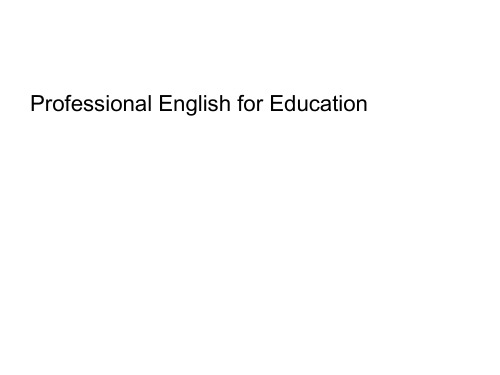
【参考译文】由于真正的专业人员不仅要知道他们 将要做什么,而且能够意识到行为的原则和理 由,因此,对于老师来说,完成此任务的一条 途径为意识到他们的教育哲学。仅凭经验不能 使一个人成为专业的成人教育者,这个人必须 还能够对自己的经验进行深刻的反思。(语序)
三、 teacher as mentor(有经验可信赖的顾 问), / fellow traveler / tour guide /Social Worker / Body Parts: ‘a big ear, big brain, big heart, big eye’/ Lamplighter /Stage manager
3、Students need to be encouraged to and taught how to participate in classroom discussions. Failure for students to do so is defined by the author as unethical. Student who fail to or refuse to actively take part in their education tend to be less interested in that process. 【参考译文】教师应该鼓励和教会学生如何参与课 堂讨论,作者将不参与课堂讨论的学生视为不 道德的,未能或拒绝积极参与教育活动的学生 将会对教育过程不大感兴趣。 (语序变换,词 性转换)
【参考译文】我们开始思考和讨论教学的一些要素, 以前,我们很少明确地提及它们。其中包括动 机,假如师生从事教与学的活动时积极性不高, 那么教与学均不是最为有效的。(指代关系, 上下文语境,语序变换)
2、Course examinations ought to serve multiple purposes: (a) to measure each student’s progress or difficulty so that student weaknesses or lack of mastery can be diagnosed and strengthened; 【参考译文】课程考试应该具有多种目的,第一, 用来测量每个学生的发展进步或者学习困难, 找出学生的缺点或不足之处,做到查缺补漏, 巩固强化。(意译)
教育哲学的意义

随着基础教育改革的日益深化,越来越多的人开始觉得具体操作层面的东西不解渴、不透彻、不深刻,他们开始寻求一种更深层的东西。
这种深层探索的主要工具或者说手段就是教育哲学。
石中英教授呼吁,教育哲学应当成为教师成长和实施教育行为的一个重要精神资源!石中英,男,1967年出生,教育学博士,现为北京师范大学教育学院副院长、教育学系主任、教授、博导。
曾获北京市第五届哲学社会科学优秀成果二等奖、北京市第七届哲学社会科学优秀成果一等奖、霍英东教育基金会第八届高校青年教师奖,主要著作有《教育学的文化性格》、《知识转型与教育改革》、《教育哲学导论》等。
10年前,我们可能会说:“教育哲学是干什么的?”但现在这样的问题似乎不会再出现了。
最近一两年,随着基础教育改革的日益深化,随着教育理论的很多基本理论问题、实践问题越来越突出,越来越多的人开始觉得具体操作层面的东西不解渴、不透彻、不深刻,他们开始寻求一种更深层的东西。
这种深层探索的主要工具或者说手段就是教育哲学。
近日,教育哲学领域著名学者、北京师范大学教育学院石中英教授呼吁,要让教育哲学成为教师成长和实施教育行为的一个重要精神资源!什么东西是好的?教育哲学为教育提供了价值判断记者:在一般人的印象中,教育是由无数琐碎的小事构成的一种具体行动,而哲学则是形而上的抽象理论,它们之间似乎没有太多的联系。
教育真的需要哲学吗?石中英:马克思主义的哲学告诉我们,事物都是普遍联系的。
这个原理说明在具体事物的中间有着一般性的知识假设、价值追求和伦理信念,比如说这里面什么东西是好的、什么东西是真的、什么东西是有意义的。
这些问题的追问和反思,是普遍存在于日常生活中的,包括存在于这种日常的教育生活中。
在实际的工作里面,一些具体教育问题的解决或者具体教育问题的思考,最后都要追溯到一些这种比较一般性的,我们用哲学的话说就是比较抽象的一些问题上来。
比如说一个老师打学生了,这是个具体问题吧?以前我们说老师打学生是天经地义的,学生学不好,老师就是要打,这就涉及很复杂的一些问题。
1教育哲学定义
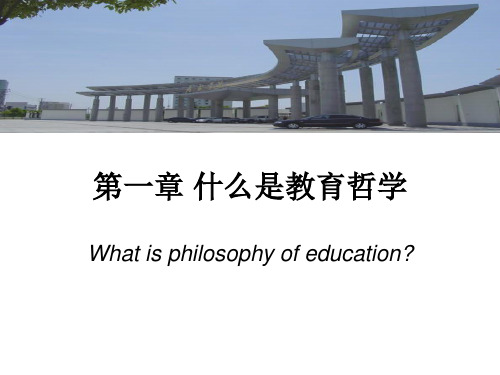
从“大写的”哲学到“小写的”哲学
“大写的哲学”: 哲学是一切文化之王,时代精神的精华;哲学家是一切 知识分子之王;哲学活动的目的是“发现”真理、善或最 终原则,揭示本质;哲学是科学的科学。 “小写的哲学”: 哲学是文化中的一类知识,和其他知识是平等的;哲学 融入人类交流之中的,担当文化评判者的角色。
二、西方教育哲学家们的定义及其分析 三、影响教育哲学定义理论框架选择的关键因素 四、20世纪的哲学变故 பைடு நூலகம்、对教育哲学的定义
20世纪60年代以前
• 从哲学的概括性出发,认为教育哲学是综合教育科学的知识而成为一个 整体的系统的学问。(德·泡耳生,克里克,美·柏格莱)
• 认为教育哲学是根据价值论来探讨教育价值的学问,如:德·梅瑟尔, 美·波德 • 认为教育哲学乃是从哲学的观点论教育,更是从教育的观点论哲学的学 问。如德贺夫 • 教育哲学在形式上是哲学、在材料上是教育的科学,并认为教育哲学是 演绎的学科。教育哲学就是寻求从总体上去了解教育并协调各个教育学 科的研究成果。如:奈勒
“具体的哲学”: 哲学的语言不再是普遍意义上的语言;理想不再是放之四 海而皆准的标准;知识见解也不再是先知的语言,而是卷 入到政治斗争的漩涡中;具体的事物或事件在哲学思考中 不再被舍弃;哲学的思考和学习不是某些人的事情,人人 必须。
目
录
一、中国教育哲学教们的定义及其分析
二、西方教育哲学教们的定义及其分析 三、影响教育哲学定义理论框架选择的关键因素 四、20世纪的哲学变故 五、教育哲学的定义
从“贵族的”哲学到“平民的”哲学
“贵族的哲学”: 哲学作为文化之王是在教育和学习的最高阶段才需要学 习和研究的;哲学不同于实用的知识,不是为了满足世俗 的需要,而是为了满足理智沉思的需要;哲学的学习和研 究需要与众不同的非凡智力和专心。
分析教育哲学终
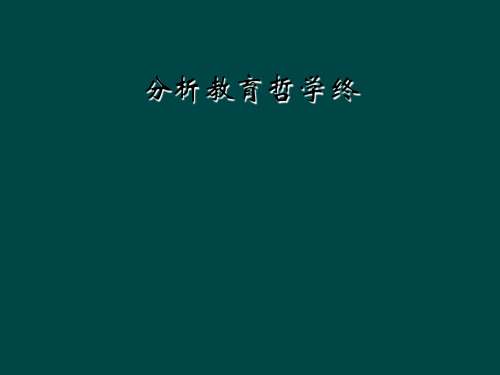
奥康纳(D. J. O’CONNOR)
代表作《教育哲学导论》。1957
这位热心教育问题的哲学家的工作进一步加 强了教育哲学分析化的趋势,将分析哲学与 教育哲学结合起来。
比较哈迪,首先把分析哲学的工具运用于“价 值标准”、“价值判断”、“教育理论”等概 念中。
第二,他对哲学在教育理论中所能起的作用问 题,采取更强硬的立场。他试图变分析哲学的 方法为一把“奥卡姆剃刀”,把无法用经验证 实的形而上学、价值论等传统教育哲学的核心 内容全部剃光,以净化教育理论,使之成为科 学。
分析教育哲学终
目录
一、时代背景
二、定义及发展
三、各个时期代表人物 四、反思与评价
分析教育哲学发展
20世纪50-70年 20世纪40年代 代
20世纪80年代 20世纪70年代末
分析教育哲学的三个阶段
将逻辑实证主义作 为公开宣称的出发 点
伦敦学派
美国派概念的“逐 一”分析时期
定义
分析教育哲学——一种“元教育哲学” (meta-philosophy of education )主张运用分 析哲学的方法对教育的概念、命题以及问题 进行分析和澄清,以便使教育活动更有意义、 更富成效。
1945年毕业于美国布鲁克林学院,1952年获 宾夕法尼亚大学哲学博士学位,1952年起任 教于哈弗大学。
主要著作有:《教育的语言》1960
《理性和教育》1973
培养了许多杰出学生。(彼得斯、索尔蒂斯)
以他为首的一批美国分析教育哲学家,形成自己 独有的风格,被称作“美国派”。
谢弗勒(美国派)的观点
强调教育研究“是一种使人们对值得去追求 的东西看得清楚,并集中注意与此的一种方 式”。
主要著作有《伦理学与教育》1966、《教育 的概念》1967、《教育哲学》1973等。
印度学生谈甘地的教育哲学 Educational Philosophy 英语作文范文
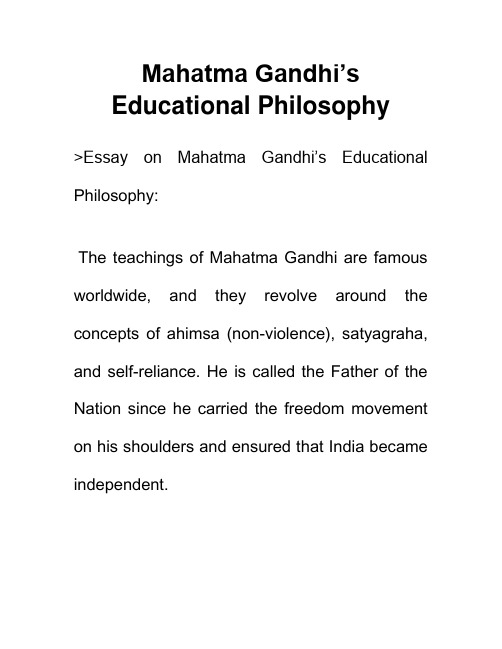
Mahatma Gandhi’sEducational Philosophy>Essay on Mahatma Gandhi’s Educational Philosophy:The teachings of Mahatma Gandhi are famous worldwide, and they revolve around the concepts of ahimsa (non-violence), satyagraha, and self-reliance. He is called the Father of the Nation since he carried the freedom movement on his shoulders and ensured that India became independent.Gandhi’s Educational Philosophy is a shining beacon for students, laying down the path they can follow to become the greatest minds of the century. It can teach us how to change the world and make it a better and egalitarian place. Given below are some essays that students can refer to.Long and Short Essays on Mahatma Gandhi’s Educational Philosophy for Students and Kids in EnglishThere is a long essay of 500 words and a short essay of 100 words. These are followed by tenlines summarising the compositions and the answers to some frequently answered questions.Long Essay on Mahatma Gandhi’s Educational Philosophy 500 words in EnglishMahatma Gandhi’s Educational Philosophy essay is meant for students of classes 7, 8, 9, and 10.Mahatma Gandhi believed that education was among the most critical facets of the functioning of the personality as well as society and the world overall. A nation with educated young people can evolve at a much faster pace than acountry with an ignorant population. He claimed that every child in India had to be trained as education was the secret to a successful life. Some of his ideologies were:Free Compulsory Education:Gandhiji wished to provide free, mandatory, and standardized primary education at the age of 7 and 14.Craft-oriented teaching:Gandhiji presumed that the highest advancement of body and spirit was possibleonly by handicrafts. He believed that self-sustenance could be obtained by learning the mechanical jobs involved in handicraft production.Self-sustenance:Gandhiji believed that the matter of primary education for the masses could not be delayed, even for a minute. The central education system cannot be discontinued for lack of resources. Students could not wait until the ruling party had organized the required funds. He also stated that schooling would be self-sustaining.Mother Tongue as the means of instruction:One of the apparent shortcomings of the current school program was that schooling was provided by the use of a foreign language-English. It prevented the production of comprehension and accuracy of thinking or consistency of mind.Concept of non-violence:The extension of the idea of non-violence to the teaching of the infant as a prospective citizen of the world became a distinctive characteristic of Gandhiji’s educational ideology. The universal education system (Buniyadi Shiksha) is imbuedwith the cardinal doctrine of non-violence and the principle of co-operative life. Based on those universal values, Gandhian educational concepts do not sacrifice their fundamental importance in the years to come. The plans would have to conceive about a self-sustaining primary education that would change the condition of the community’s lowest. The argument that this schooling should be focused on experience, problem-solving, and constructive practice, rather than pure book study, is entirely accurate.Integral education, which allows the entire being of an individual to evolve, education that stresses character-building and cultural identification, is again obviously desirable. It is equally clear that, in our state-sponsored schemes, we have failed miserably to provide free, compulsory education to all.As a consequence, the Gandhian paradigm maintains its importance and appeal. Nevertheless, whether this knowledge may be learned exclusively or mainly by studying art, and if future recipients or the state approves it, remains to be seen. Finally, the Gandhianparadigm requires, in my view, an interconnected framework for integrating or addressing older and newest innovations that are evolving every day.Learning of computers, mobiles, and the internet along with the benefits of Artificial Intelligence has to be incorporated into such frameworks. As it stands, it tends to be quite backward-looking or, at any rate, built for a stagnant culture in which constant ancestral jobs remain from generation to generation. I believe the coming era should be one with incredible and unparalleled shifts.However, this does not imply that the longstanding values that Gandhi has lived up to and championed will lose their impact. What this implies is that we are going to have to find new and different ways to interpret, recognize, communicate, and live them out.Short Essay on Mahatma Gandhi’s Educational Philosophy 100 Words in EnglishMahatma Gandhi’s Educational Philosophy essay is directed towards students of classes 1,2,3,4,5, and 6.Mahatma Gandhi championed the cause of education and taught students how to be self-reliant and not be subservient to the British. To this cause, he wanted schools to conduct classes in the mother tongue of the region. He was determined that craft education would help students and evoke the correct balance between mechanical and mental labor.He incorporated the ideas of self-reliance and non-violence in his educational philosophy. Gandhi’s understanding of creation, schooling, and society was modern. He utilized the three main philosophies of education in his writings.These were the concepts of naturalism, idealism, and pragmatism. His teachings will serve as a source of inspiration to students of future generations.10 lines on Mahatma Gandhi’s Educational Philosophy in EnglishHis educational philosophy bloomed during his experiences as a lawyer in South AfricaGandhi’s involvement in the freedom movement and the British’s cruelty inspired him to write his educational philosophyHis philosophy incorporates craft education schemesThe philosophy is based on the values of non-violenceGandhi’s teachings revolve around the concept of non-violenceHe tells us to be socially aware and help those in need around usGandhi stresses the importance of learning and studying in our mother tongueHe wants free and compulsory education for children between the ages of 7 to 14His view on education is a source of inspiration for students around the worldIf we follow his educational philosophy, we can make our country a wonderful place.FAQ’s on Mahatma Gandhi’s Educational Philosophy EssayQuestion 1.How can Gandhi’s Educational Philosophy help us?Answer:Gandhi’s teachings can help us to become self-reliant, empowered, and knowledgeable individuals with the capacity to change the world.Question 2.What are some of the core ideologies of Mahatma Gandhi’s Educational Philosophy?Answer:Some of the core tenets are social awareness, self-reliance, non-violence, instruction in themother tongue, and free, compulsory education for all students.Question 3.Is Mahatma Gandhi’s educational philosophy relevant today?Answer:Gandhi’s teachings are a source of inspiration for all people worldwide. It has much relevance in current circumstances.。
教育哲学英语面试问题
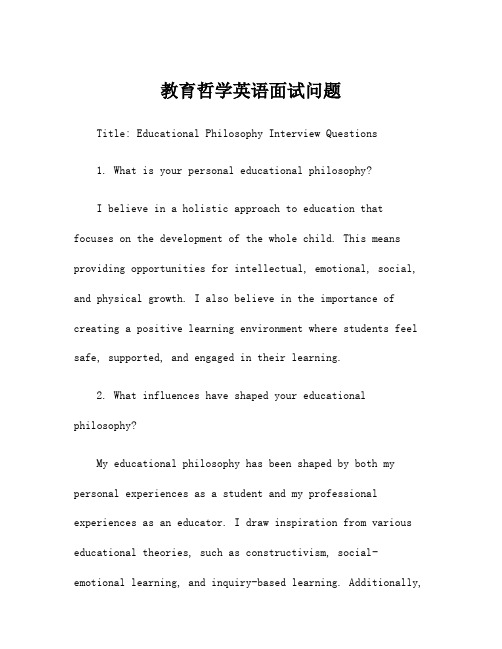
教育哲学英语面试问题Title: Educational Philosophy Interview Questions1. What is your personal educational philosophy?I believe in a holistic approach to education that focuses on the development of the whole child. This means providing opportunities for intellectual, emotional, social, and physical growth. I also believe in the importance of creating a positive learning environment where students feel safe, supported, and engaged in their learning.2. What influences have shaped your educational philosophy?My educational philosophy has been shaped by both my personal experiences as a student and my professional experiences as an educator. I draw inspiration from various educational theories, such as constructivism, social-emotional learning, and inquiry-based learning. Additionally,my own experiences working with diverse student populations have influenced my beliefs about the importance of equity and inclusion in education.3. How do you approach the curriculum and lesson planning?I believe in designing a curriculum that is both rigorous and relevant to students' lives. When planning lessons, I consider the interests, abilities, and learning styles of my students. I also incorporate real-world connections and opportunities for hands-on learning. Furthermore, I aim to integrate cross-curricular connections to create a more comprehensive and meaningful learning experience.4. How do you differentiate instruction to meet the needs of diverse learners?I believe in utilizing a variety of instructional strategies and resources to accommodate different learning styles and abilities. This includes providing opportunitiesfor small group instruction, offering choices for assignmentsand assessments, and utilizing technology to support personalized learning. I also believe in fostering a supportive classroom community where students feel comfortable taking risks and embracing challenges.5. How do you assess student learning in your classroom?I believe in using a variety of formative and summative assessments to gauge student understanding and growth. Formative assessments, such as quizzes, discussions, and projects, allow me to monitor and adjust instruction as needed. Summative assessments, such as tests and portfolios, provide a snapshot of student achievement. Additionally, I believe in providing constructive and timely feedback to support student learning and growth.6. What is your approach to classroom management?I believe in establishing clear expectations and routines to create a structured and productive learning environment. I also believe in fostering positive relationships with mystudents and providing opportunities for them to take ownership of their behavior. When conflicts arise, Iprioritize open communication and collaborative problem-solving to address issues in a respectful and constructive manner.7. How do you engage parents and families in the educational process?I believe in the importance of building partnerships with parents and families to support student success. This includes regular communication about student progress and opportunities for family involvement in school activities. I also believe in seeking input from parents and families to better understand and address the needs of my students.8. How do you stay current with educational trends and research?I prioritize ongoing professional development and seek out opportunities to learn from colleagues, attendconferences, and engage with educational literature. I also believe in reflecting on my own practice and seeking feedback from others to continuously improve and evolve as an educator.9. How do you address the social and emotional needs of your students?I believe in creating a supportive and inclusiveclassroom environment where students feel valued and respected. I also prioritize teaching social-emotional skills, such as self-awareness, empathy, and conflict resolution, to help students navigate their emotions and relationships. Additionally, I believe in providing access to counseling and support services when needed.10. How do you advocate for educational equity and inclusivity?I believe in advocating for equitable and inclusive practices that address the diverse needs and strengths of all students. This includes challenging biases and stereotypes,advocating for resources and support for marginalized students, and promoting culturally responsive teaching practices. I also believe in collaborating with colleagues and community members to create a more inclusive and just educational system.In conclusion, these interview questions reflect my beliefs and practices as an educator, as well as my commitment to creating a positive and impactful learning experience for my students. I am dedicated to continuously reflecting on and refining my educational philosophy to best serve the diverse needs of my students. Thank you for considering me for this opportunity.。
全人教育的教育哲学基础
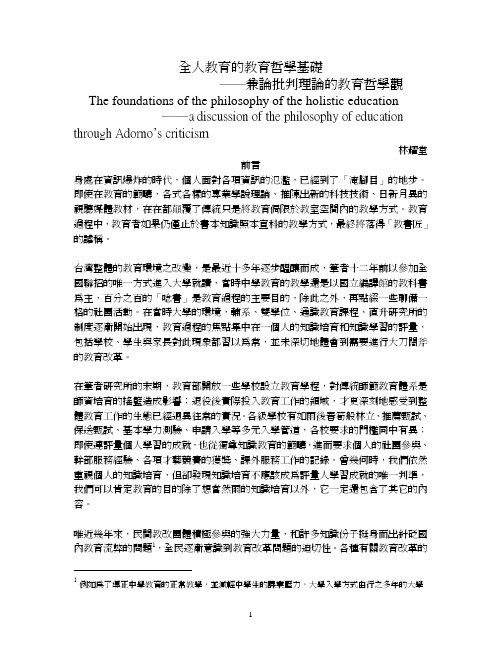
全人教育的教育哲學基礎──兼論批判理論的教育哲學觀The foundations of the philosophy of the holistic education──a discussion of the philosophy of education through Adorno’s criticism林耀堂前言身處在資訊爆炸的時代,個人面對各項資訊的氾濫,已經到了「淹腳目」的地步。
即使在教育的範疇,各式各樣的專業學說理論、推陳出新的科技技術、日新月異的視聽媒體教材,在在都顛覆了傳統只是將教育侷限於教室空間內的教學方式。
教育過程中,教育者如果仍僅止於書本知識照本宣科的教學方式,最終將落得「教書匠」的謔稱。
台灣整體的教育環境之改變,是最近十多年逐步醞釀而成,筆者十二年前以參加全國聯招的唯一方式進入大學就讀,當時中學教育的教學還是以國立編譯館的教科書為主,百分之百的「唸書」是教育過程的主要目的,除此之外,再點綴一些聊備一格的社團活動。
在當時大學的環境,輔系、雙學位、通識教育課程、直升研究所的制度逐漸開始出現,教育過程的焦點集中在一個人的知識培育和知識學習的評量,包括學校、學生與家長對此現象都習以為常,並未深切地體會到需要進行大刀闊斧的教育改革。
在筆者研究所的末期,教育部開放一些學校設立教育學程,對傳統師範教育體系是師資培育的搖籃造成影響;退役後實際投入教育工作的領域,才更深刻地感受到整體教育工作的生態已經迥異往常的實況。
各級學校有如雨後春筍般林立、推薦甄試、保送甄試、基本學力測驗、申請入學等多元入學管道,各校要求的門檻同中有異;即使連評量個人學習的成就,也從獨尊知識教育的範疇,進而要求個人的社團參與、幹部服務經驗、各項才藝競賽的獲獎、課外服務工作的記錄。
曾幾何時,我們依然重視個人的知識培育,但卻發現知識培育不應該成為評量人學習成就的唯一判準,我們可以肯定教育的目的除了想當然爾的知識培育以外,它一定還包含了其它的內容。
高等教育哲学
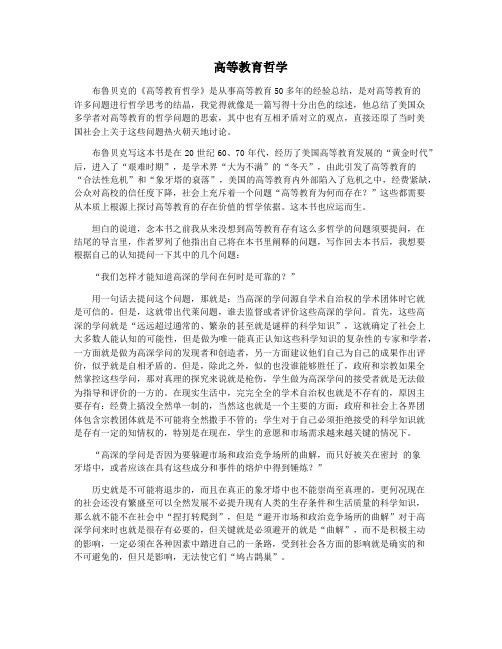
高等教育哲学布鲁贝克的《高等教育哲学》是从事高等教育50多年的经验总结,是对高等教育的许多问题进行哲学思考的结晶,我觉得就像是一篇写得十分出色的综述,他总结了美国众多学者对高等教育的哲学问题的思索,其中也有互相矛盾对立的观点,直接还原了当时美国社会上关于这些问题热火朝天地讨论。
布鲁贝克写这本书是在20世纪60、70年代,经历了美国高等教育发展的“黄金时代”后,进入了“艰难时期”,是学术界“大为不满”的“冬天”,由此引发了高等教育的“合法性危机”和“象牙塔的衰落”,美国的高等教育内外部陷入了危机之中,经费紧缺,公众对高校的信任度下降,社会上充斥着一个问题“高等教育为何而存在?”这些都需要从本质上根源上探讨高等教育的存在价值的哲学依据。
这本书也应运而生。
坦白的说道,念本书之前我从来没想到高等教育存有这么多哲学的问题须要提问,在结尾的导言里,作者罗列了他指出自己将在本书里阐释的问题,写作回去本书后,我想要根据自己的认知提问一下其中的几个问题:“我们怎样才能知道高深的学问在何时是可靠的?”用一句话去提问这个问题,那就是:当高深的学问源自学术自治权的学术团体时它就是可信的。
但是,这就带出代莱问题,谁去监督或者评价这些高深的学问。
首先,这些高深的学问就是“远远超过通常的、繁杂的甚至就是谜样的科学知识”,这就确定了社会上大多数人能认知的可能性,但是做为唯一能真正认知这些科学知识的复杂性的专家和学者,一方面就是做为高深学问的发现者和创造者,另一方面建议他们自己为自己的成果作出评价,似乎就是自相矛盾的。
但是,除此之外,似的也没谁能够胜任了,政府和宗教如果全然掌控这些学问,那对真理的探究来说就是枪伤,学生做为高深学问的接受者就是无法做为指导和评价的一方的。
在现实生活中,完完全全的学术自治权也就是不存有的,原因主要存有:经费上搞没全然单一制的,当然这也就是一个主要的方面;政府和社会上各界团体包含宗教团体就是不可能将全然撒手不管的;学生对于自己必须拒绝接受的科学知识就是存有一定的知情权的,特别是在现在,学生的意愿和市场需求越来越关键的情况下。
